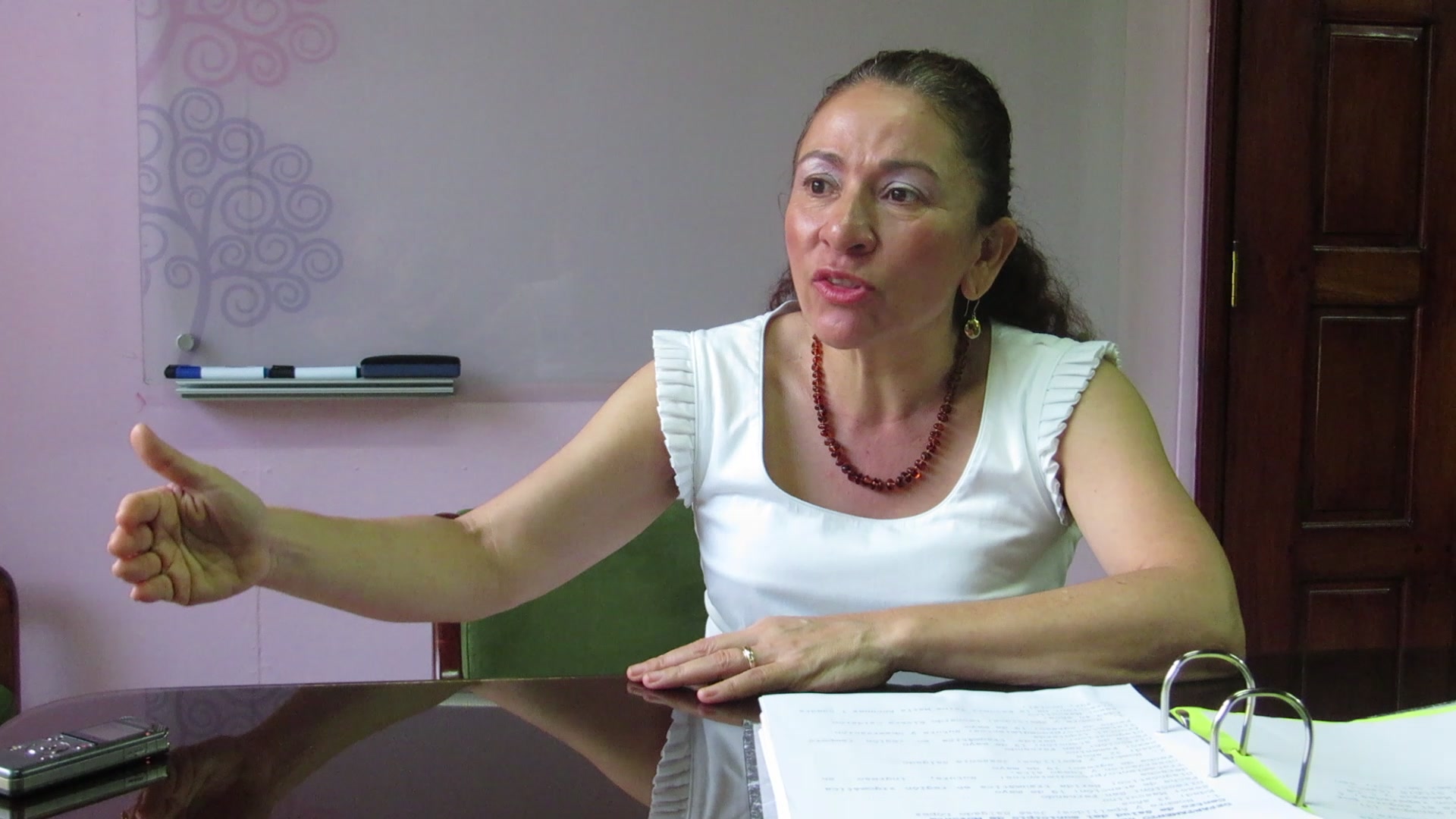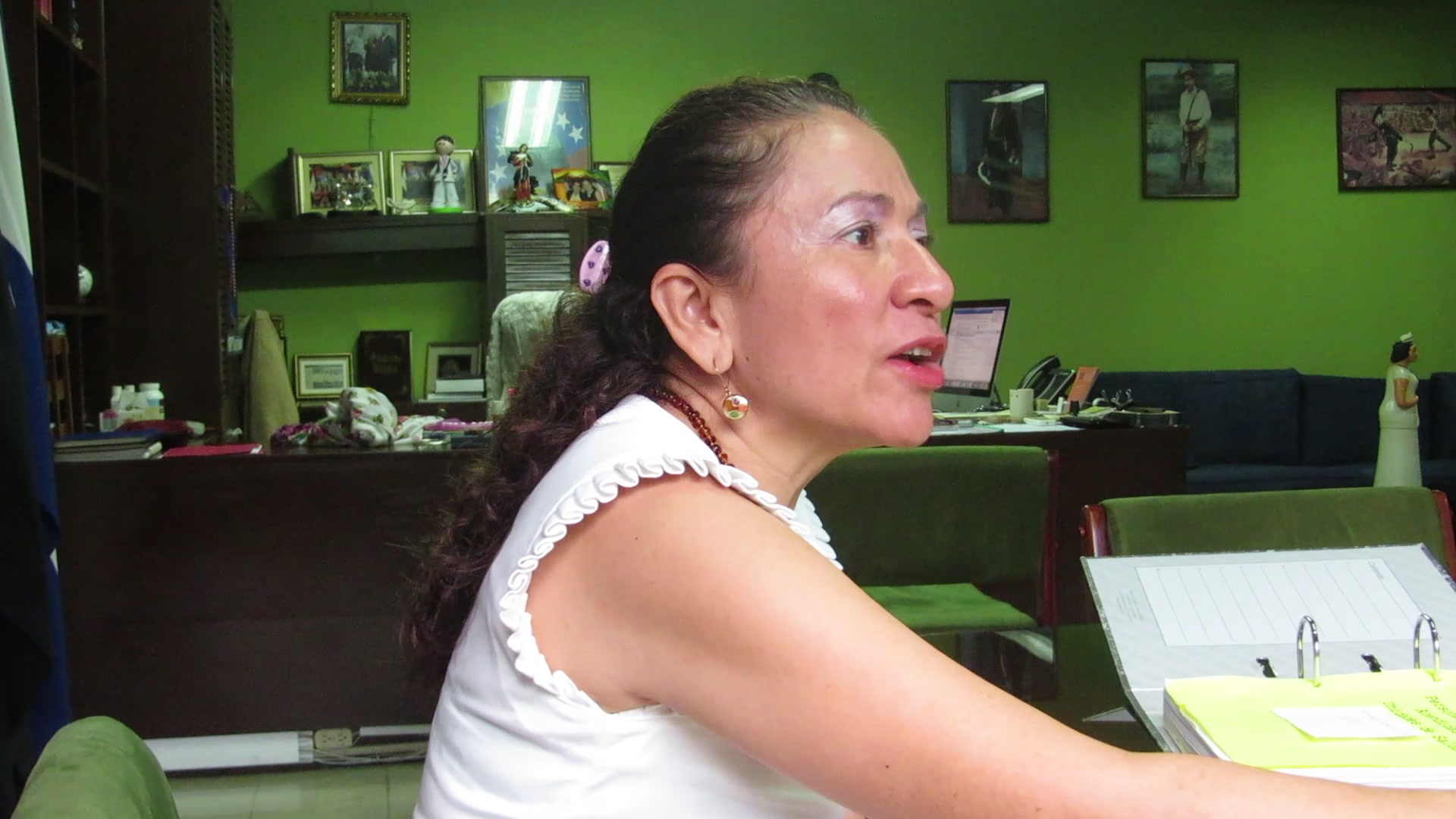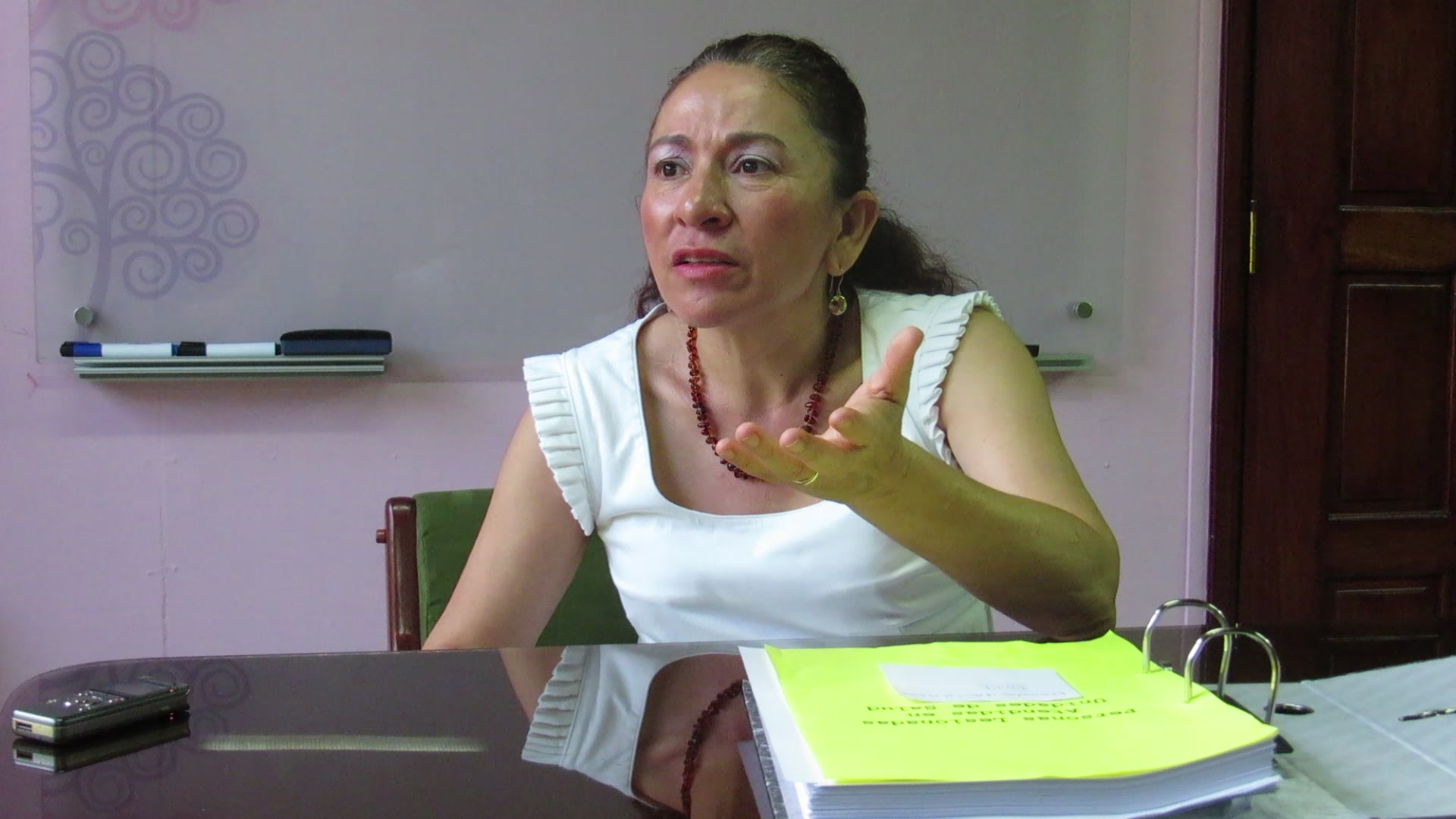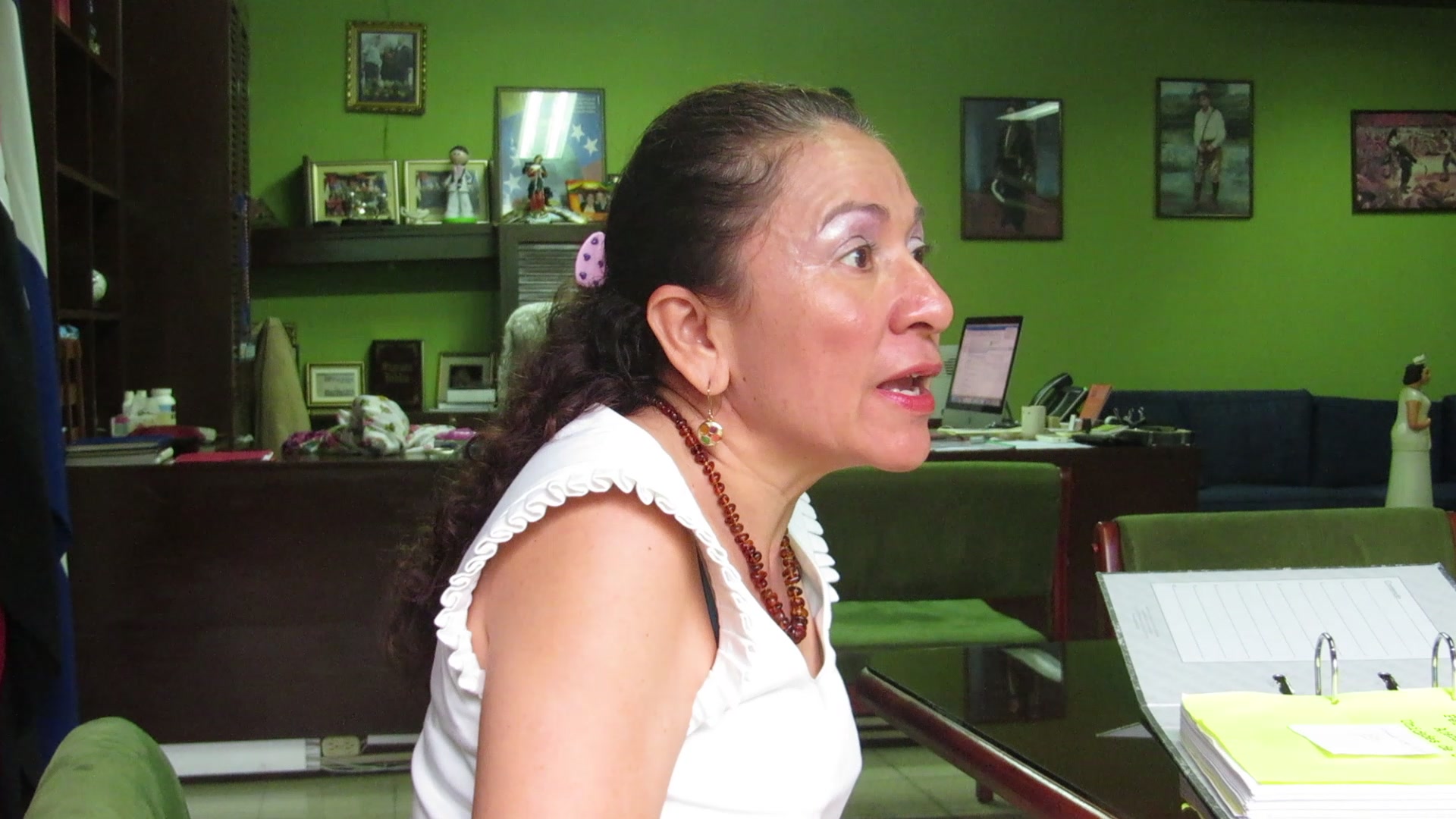Tortilla con Sal, October 10th 2018
Interview with Nicaragua's Health Minister Dr. Sonia Castro
 Tortilla con Sal: Can you summarize the experience of the Health Ministry as an institution during the failed coup attempt?
Tortilla con Sal: Can you summarize the experience of the Health Ministry as an institution during the failed coup attempt?
Minister Sonia Castro : Really we were the object of a great many lies, disinformation, sowing of hatred from a group of people here in Nicaragua who manipulated feelings and information trying to get popular support and create resentment towards our good government making people believe we were not paying attention to their demands. But in truth the health units across the whole country from April 18th until July 14th gave care to 2064 wounded, people who were wounded in different locations and some very related too and involved directly in the attempted coup d’etat.
It’s important to point out that in all the health units from the beginning of the first outbreaks of violence in our country we ordered the setting up of a triage mechanism, reinforced the emergency rooms, laboratory services, diagnostic methods, hospitalization, operating theaters and intensive care units so that our health units had the capacity to respond.
At one point our hospitals with the staff they had were under a great deal of pressure with people seeking care and we had to reinforce the hospitals with people who were not scheduled to work and they turned up. Some arrived to volunteer and others we called on to go and reinforce our services so as to guarantee care for the population and save lives.
For all this care given in the whole country we have the chronology and the legal medical documentation because they are in the clinical files of care given to patients with the date, the time, the hospital, the diagnosis made of the patient and the procedure followed. When people arrived at out health units the priority was to safe their lives, classifying them according to their clinical condition and the most serious cases received care from a whole team of specialists.
Some people were dealt with as lightly wounded and they received treatment straight away before going back to their homes. We had other patients who stayed as long as a month inhospital as a result of the serious damage they had and were operated on more than once. We have patients too with osteo-muscular damage and we made use of osteo-synthetic material to ensure they were able to move about and ensure they got back to full health. Many of these patients are still in our health units, in follow up, in rehabilitation for the problems they presented.
We presented this documentation to the Interamerican Commission for Human Rights and they also carried out interviews in the Hospital Alemán, the Lenin Fonseca Hospital and the Teaching Hospital in León both with patients and with health workers. The Interamerican Commission for Human Rights interviewed health workers in the hospitals and asked them if they had received an order not to give care. and at no time is there any evidence that any worker in the public health system hospitals has claimed they were ordered not to give care to someone.
It’s also important to mention that during this period of the attempted coup, in our health units our workers were threatened with death, we were also attacked in our emergency rooms, our hospitals and our health centers. Our workers were also threatened when they had to pass through the barricades of death in order to get to their health units.
I want to recognize that during the months of the terror sown in Nicaragua, 95% of our health workers presented for work at our health units. The workers complied with their schedule of work and the hospitals and health centers never shut down and we ensured sufficient financial resources to protect the lives of our population.
We have the documentation across the whole country for every patient at the place where they received health care, for the 2064 people wounded and also separately the cases that were dead on arrival or who died while receiving care at the public sector health units. That was also presented as evidence.
 We also presented three interviews. One interview which was done spontaneously by doctors in La Trinidad, Estelí and one by doctors at Leon’s “Oscar Danilo Rosales Argüello” Teaching Hospital, in which they make clear they never received an order to deny care to people arriving at the emergency room or to deny care to anyone and that they were open, giving care to the whole population. But the IACHR did not make those interviews available.
We also presented three interviews. One interview which was done spontaneously by doctors in La Trinidad, Estelí and one by doctors at Leon’s “Oscar Danilo Rosales Argüello” Teaching Hospital, in which they make clear they never received an order to deny care to people arriving at the emergency room or to deny care to anyone and that they were open, giving care to the whole population. But the IACHR did not make those interviews available.
And in a national television program of Carlos Fernando Chamorro in which appeared some doctors who were not Sandinista supporters and health personnel who were not Sandinista supporters, they ratified in that program that at no time were they instructed to deny care to the population.
That is to say, the evidence demonstrates that the workers in the health units, because there are people outside the public health system who also say so, but within the public health system, workers made pronouncements in all the hospitals and health units ratifying their commitment to serve the population as they have done over the last eleven years. And the Ministry of Health is a public servant with no distinction as to class, political opinion, religion, sex, age or sexual orientation.
Because that is our job. This is a public system based on Christian principles, on the principles of solidarity and, of course, socialism, to serve the community. Furthermore, we guaranteed medical supplies including all the necessary inputs despite all kinds of situations. We had to pay the people operating the roadblocks so they would let through our trucks in the departments of Chontales, Matagalpa and Estelí and at the roadblock on the Panamerican Highway at Las Maderas.
We had to pay for the medicines to pass in order to deliver them. They even held up a delivery of anti-mosquito powder in Chontales and there we had to negotiate, try and open their minds, create consciousness and also to pay. But we were were bound to ensure supplies for the hospitals and our health centers so as to continue ensuring care for our country’s people.
Because apart from the people who were wounded we also had our normal care, mothers in delivery, emergencies, traumas, traffic accidents, people turning up with one or other pain or ailment, heart patients suffering instability, people with hypertension, diabetics...Our health units were always open to serve, as they have been and will be as part of this model of community and family health to serve and provide health care.
TcS :- During the period of the attempted coup, what was the relation between the public health sector and the private health sector?
Minister Sonia Castro : Firstly, as the Ministry of Health, the responsible health authority, we were in permanent contact with the directors of the Integral Local Health Care Authorities (SILAIS) and the hospitals and private clinics in case they needed any support, in case they received any patients that merited support from the Health Ministry. And we received transfers of patients who had suffered harm or were wounded and were cared for in the first instance by private hospitals like the “Vivian Pellas” Hospital or the Baptist Hospital but whom, once they received that immediate care were transferred to our country’s public hospitals. And we received those transfers, even in some cases we went to collect them in our ambulances because the private sector asked us to collect those wounded people they had in their hospitals. We complemented each other. We helped each other. We coordinated together and we asked them what they needed so as to ensure the care and protection of these patients lives.
I also want to mention the hospitals that were besieged. They even entered inside hospitals, the hospital in Masaya, the Hospital Alemán in Managua, also the Santiago Hospital in Jinotepe where these terrorist thugs entered masked with weapons like mortar launchers, home made weapons and hand guns to threaten health workers, or worse, to attack relatives of patients. Because they stole their mobile phones from the patients’ relatives. And that happened in the hospitals I mentioned.
 In the recently opened “Fernando Velez Paiz” Hospital, they wanted to set fire to it, destroy it, andthis is a hospital built to deliver care to impoverished people and it was defended by the population and the health workers. And it was the coup promoters who tired to do all that so as to instill terror in Nicaragua’s families. 47 ambulances were damaged and one completely burnt, ambulances we had only just obtained so as to transport patients from poor families, to transport those who cannot leave their house and need to be brought in for care. And the public hospitals they tried to damage are also to serve this country’s impoverished families because those who have money go and pay in the private hospitals or else they go overseas.
In the recently opened “Fernando Velez Paiz” Hospital, they wanted to set fire to it, destroy it, andthis is a hospital built to deliver care to impoverished people and it was defended by the population and the health workers. And it was the coup promoters who tired to do all that so as to instill terror in Nicaragua’s families. 47 ambulances were damaged and one completely burnt, ambulances we had only just obtained so as to transport patients from poor families, to transport those who cannot leave their house and need to be brought in for care. And the public hospitals they tried to damage are also to serve this country’s impoverished families because those who have money go and pay in the private hospitals or else they go overseas.
The coup activists invaded the hospital in Nueva Guinea and even threatened patients and we had to talk with the priests there, to the religious leaders and the politicians for them to leave the hospital because we had patients. And there in the middle of that situation of terror, of fear, of death threats, we never stopped giving care to anyone who asked it.
And as I have said, we have the evidence of this because they are medical legal files and too we intend to continue caring for our population without distinction of any kind because here everyone has the right to health because health care here is free and it is a right this model of community and family health guarantees during the care process.
TcS : Can you talk a bit about the impact of this period of terorism on MINSA and its personnel?
Minister Sonia Castro : Really all of Nicaragua was taken by surprise by the diabolical plan made ready to obstruct the course of prosperity we were following in this country, despite our impoverishment and limitations. And with health care as one of its strengths, because it uses a model that complements itself via the community and the families and by means of which we have reached health indicators that show the way we need to go to bring better health conditions to our people.
However, this plan included smearing, attacking and spreading the greatest possible number of falsehoods about our health system so as to mount a coup against us. And that attempted coup was also an emotional blow to our health workers. Because when I tell you that we received death threats, we also had health workers kidnapped. They took a doctor from her health center in Nagarote for three hours and we didn’t know where she was. We didn’t know if she would return or if they would hand her over and she was held for three hours.
A doctor traveling with a patient to the Asunción Hospital in Juigalpa was kidnapped at a roadblock and held in a house and likewise her mother who went looking for her so they would hand her over, she too was kidnapped. A health worker in Managua’s ambulance center was tortured at the Polytechnic University (UPOLI) and there they threw some corrosive liquid on his genitals. This emotional damage made health workers feel panic about doing their job which until that moment had been merely one of Christian service, of a vocation of assistance to people. And the coup promoters wanted to stop that so as to paralyze the country. But they failed.
 They failed. And once we recovered stability and now got heading along the way to Peace, the health Ministry together with the Panamerican Health Organization worked out a mental health plan to rcover once more the spirit of action, service, seeking unity among everyone in our strength, in Christian faith to continue advancing so as to serve.
They failed. And once we recovered stability and now got heading along the way to Peace, the health Ministry together with the Panamerican Health Organization worked out a mental health plan to rcover once more the spirit of action, service, seeking unity among everyone in our strength, in Christian faith to continue advancing so as to serve.
I want to mention that this mental health plan was designed too for people seriously hurt and relatives of people deceased and currently we are visiting these families house to house. The plan has also held assemblies, encounters, meetings with all health workers to discuss the issue, of how we are feeling, how we should respond to this situation, how to prepare ourselves mentally and spiritually to continue addressing these challenges.
Because Nicaragua has many challenges in the area of health care and we have to keep working at it. So we set up this plan. And out best mental health specialists who deal with this area, psychiatrists, psychologists. social workers with the help and cooperation of the Panamerican Health Organization worked out the content of this plan, the subjects and methodology of how we are going to hold these workshops to recover our strength to move ahead again, without forgetting, but trying to leave behind that dark period and to move forward .
That is a past we have to keep in mind so it cannot happen again, but also a past that should give us the strength to be able to say we can make progress, we can move ahead and we do have the right to the Nicaragua we were building, a Nicaragua with Peace for everyone we we all achieve the Common Good.
